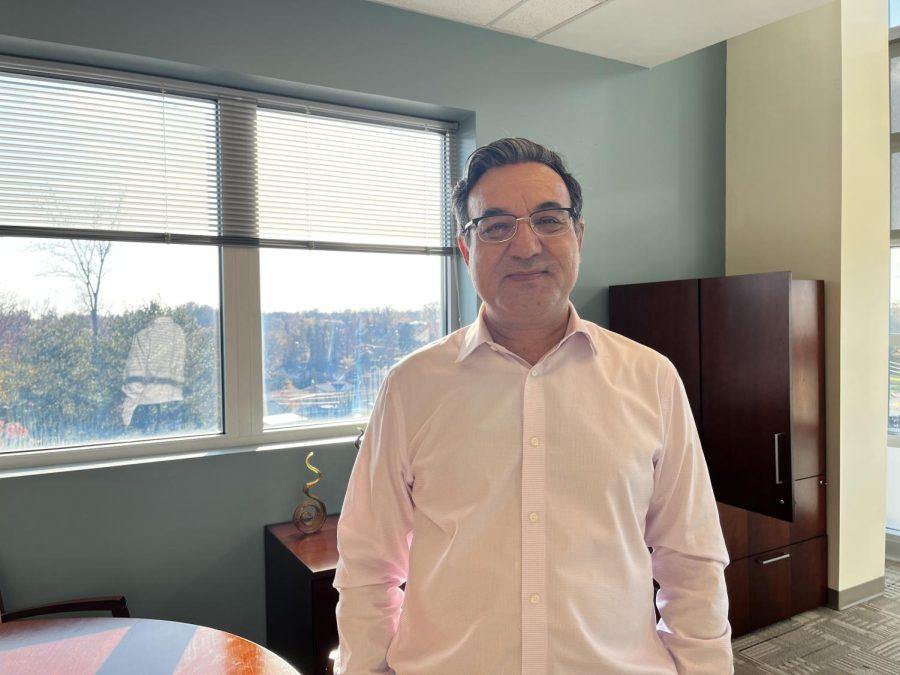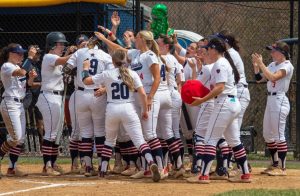“Beyond the Staff”: Dr. Amjad Ali!
November 7, 2022
Dr. Amjad Ali describes his day-to-day as “24/7.”
He serves as a Chief Academic Officer and also an Administrative Officer and oversees all things to make sure the programs are of high quality, and that professors can provide services to all students like advising and program quality. This means that there are constant meetings, for example, there are Dean’s council meetings, one on ones with his department heads, staff meetings and success coaching.
He also runs the Academic Media Center (AMC) with Tim Jones and has strategic initiative meetings with industry representatives with the government to ensure that there are good jobs for students.
Other day-to-day operations include Dr. Ali working with and establishing partnerships with industry representatives and the government externally. He also works with different units like PR and system implementation and any other student issues that may escalate to the Dean level and with faculty to resolve any issues.
He explained that there is so much that happens behind the scenes to keep everything running very smoothly.
“We have great faculty in place to keep this schedule going,” Dr. Ali said.
He explained how he works with community colleges and high schools to collaborate about college-level classes so they can take our credit courses at RMU.
“It is all so satisfying because at the end of the day you’re helping students to succeed and provide them with amazing opportunities that they can have,” Dr. Ali said. “40% of our students are first-generation students, so it’s good to help them financially and economically to be ready for their successful futures. We want to help our students, not only in their studies but with internships and with jobs. Every day is different.”
When he graduated from George Washington University with his Doctorate and Masters, he joined the University of Maryland part-time at first. Then was put into a Program Director position that they had available to manage technology management programs where his areas were engineering and computer technology. He was the youngest director there to manage a major graduate program.
Dr. Ali started and developed new programs in the technology area and worked in that position for 5 years, and was then offered a Dean position in New York City at a DeVry University entity school called Keller School of Management where his office was in Times Square.
He then joined the American Council of Engineering Companies in Washington, D.C., and returned to Maryland as a Director of Center of Security Studies.
While there he worked on managing cyber programs and being part of a designation called National Center of Academic Excellence in Cyber Defensive Education of which RMU is also part of. This was his exposure to the Cyber Security world, and that’s where he met a lot of cybersecurity experts who helped to promote his programs all over the world.
Dr. Ali’s programs were very much needed in Maryland, and after a while, there were 8 different types of Cyber Security Programs. He also helped to manage staff and helped the state of Maryland to become the main head center of cyber security. He also got to meet and invite James Clapper, Former Director of National Intelligence, to events, and create scholarships for students in cyber security.
“There is so much need for Cyber Security students. It is so important to our world today,” Dr. Ali said.
Dr. Ali revealed he never expected to become a Dean at Robert Morris, in other roles he was very used to going up and down in his positions.
“You always had to be ready to either become a follower or to become a leader,” Dr. Ali said.
He was looking at the job position through the Chronicle Of Higher Education, and it really intrigued him and he saw how diverse RMU is and how many different types of areas there were in SIHSS like communication and organization leadership, computer information systems, arts and humanities and social sciences.
Dr. Ali also loved how “RMU is a student central school where you can work with students one on one as opposed to bigger schools where you may just be a number.” He applied and was selected for the initial interview, and made it to the finalists where he got to tour the campus during the beginning of COVID-19. “I remember coming to the next interview, the airports were so quiet because it was the start of the pandemic, we had no idea how serious this would be.”
He explains how the board was in his favor and was so happy to have gotten the position, yet he knew it would be tough due to COVID and how hard it was not being able to see his staff in person but instead virtually. He said how he was on the call 24/7 and how he would have to discuss COVID protocols for staff and students. “If you made it here through the pandemic, you can make it anywhere.” Yet, he is very thankful for his staff and students for how everyone worked together, “We all together survived those days.”
“Robert Morris has been really great to me.” Dean Ali said, “they gave me an amazing opportunity to create these programs and allow me to work closely with our students, as it is the sole focus of our institution.”
He has seen how connected alumni are, and how they always recommend this school to family, friends and so many other people. “There are always ups and downs because academia goes through so many changes, and in my role, I am almost the bridge between the top leaders and faculty.” He knows that when he has to make some strategic decisions, he makes sure to get everyone’s feedback, but not everyone is going to be happy. “We are humans, we have to learn from each other.” Dr. Ali talks about how hard it is to manage faculty, and how he wants to make everyone happy, but knows that’s not always possible. As long as the decision is to benefit students, no matter who may disagree, he always puts the students first. “If it’s not going to help students at the end of the day, then we really need to think twice about our decisions.”
“I always think my father is my inspiration,” Dr. Ali said, “because he was also in the education field. He managed an entire state of schools, and I was always there with him.”
They were attached at the hip and did everything together. His father would even educate him while they would travel around, and would teach him almost everything he knew.
“He motivated me, and put me through very elite schools from childhood.” Dr. Ali explained how he left home at age 10 to start at a military school where everything was very regimented and learn how to do everything on his own. After he left, he went to college for engineering and was picked to receive a full-ride scholarship to come to the states. “My father was my hero.”
“The cool part about The School of Informatics, Humanities and Social Sciences is that you can meet very diverse types of students and faculty, which is what I look for,” Dr. Ali said. “Here, our programs are interdisciplinary because we take advantage of all these different fields where there is relevancy and there is an access to create some real magic.”
He wants students to be able to have a broad spectrum of knowledge because he knows that it is important to have all types of experience not only through one field of study but even by learning how to develop a big-picture mindset.
“Our staff are so committed and passionate, which is so exciting.” He doesn’t want students to feel like just a number, he shows how he, and the staff, care so deeply for their students. “We mean to help and encourage our students, and we will continue to do so.”












